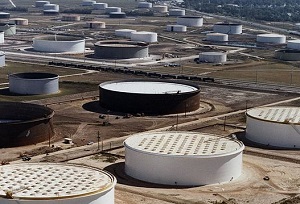U.S. NatGas Firms on Supply Woes as Focus Turns to Storage Report
(Reuters) — U.S. natural gas futures were near their highest in about three years on Thursday, buoyed by overall projections for lower supply as investors prepared for a federal report expected to show a smaller-than-normal storage build.

Front-month gas futures for October delivery were last up 2.8 cents, or 0.6%, at $4.643 per million British thermal units (mmBtu) by 9:32 a.m. EDT (1332 GMT), in choppy trading that saw prices flip from negative territory to as much as 0.8% higher.
On Wednesday, prices touched their highest since late November 2018 after Hurricane Ida knocked out most of supply from the Gulf of Mexico.
"It is a season of tight supply - the shoulder month's weaker demand is overshadowed by supply concerns. This perhaps explains why each time, prices move higher after taking some breath on the way upward," said Zhen Zhu, economist at Oklahoma City-based C.H. Guernsey. "With this storage report, we may see the same pattern, unless we witness a much larger than expected injection."
U.S. utilities likely injected a lower-than-normal 25 billion cubic feet (bcf) of natural gas into storage last week as unusually warm weather increased demand for fuel to keep air conditioners humming, a Reuters poll of analysts showed on Wednesday.
Data provider Refinitiv said total U.S. production has averaged 88.4 billion cubic feet per day (bcfd) so far in September, down from 92.0 bcfd in August. The all-time monthly high is 95.4 bcfd set in November 2019.
"This morning's weather models are predicting higher near-term demand on account of the weather, but this has so far only had a moderate effect on the price," said John Abeln, an analyst at Refinitiv.
U.S. pipeline exports to Mexico climbed to an average of 6.5 bcfd this month so far, from 6.2 bcfd in August, but were slightly lower than June's monthly record of 6.7 bcfd.
With European and Asian gas both trading over $17 per mmBtu, compared with just under $5 for the U.S. fuel, analysts have said buyers around the world would keep purchasing all the liquefied natural gas (LNG) the United States can produce.
Related News
Related News

- Keystone Oil Pipeline Resumes Operations After Temporary Shutdown
- Biden Administration Buys Oil for Emergency Reserve Above Target Price
- Freeport LNG Plant Runs Near Zero Consumption for Fifth Day
- Enbridge to Invest $500 Million in Pipeline Assets, Including Expansion of 850-Mile Gray Oak Pipeline
- Williams Delays Louisiana Pipeline Project Amid Dispute with Competitor Energy Transfer
- Evacuation Technologies to Reduce Methane Releases During Pigging
- Editor’s Notebook: Nord Stream’s $20 Billion Question
- Enbridge Receives Approval to Begin Service on Louisiana Venice Gas Pipeline Project
- Russian LNG Unfazed By U.S. Sanctions
- Biden Administration Buys Oil for Emergency Reserve Above Target Price




Comments